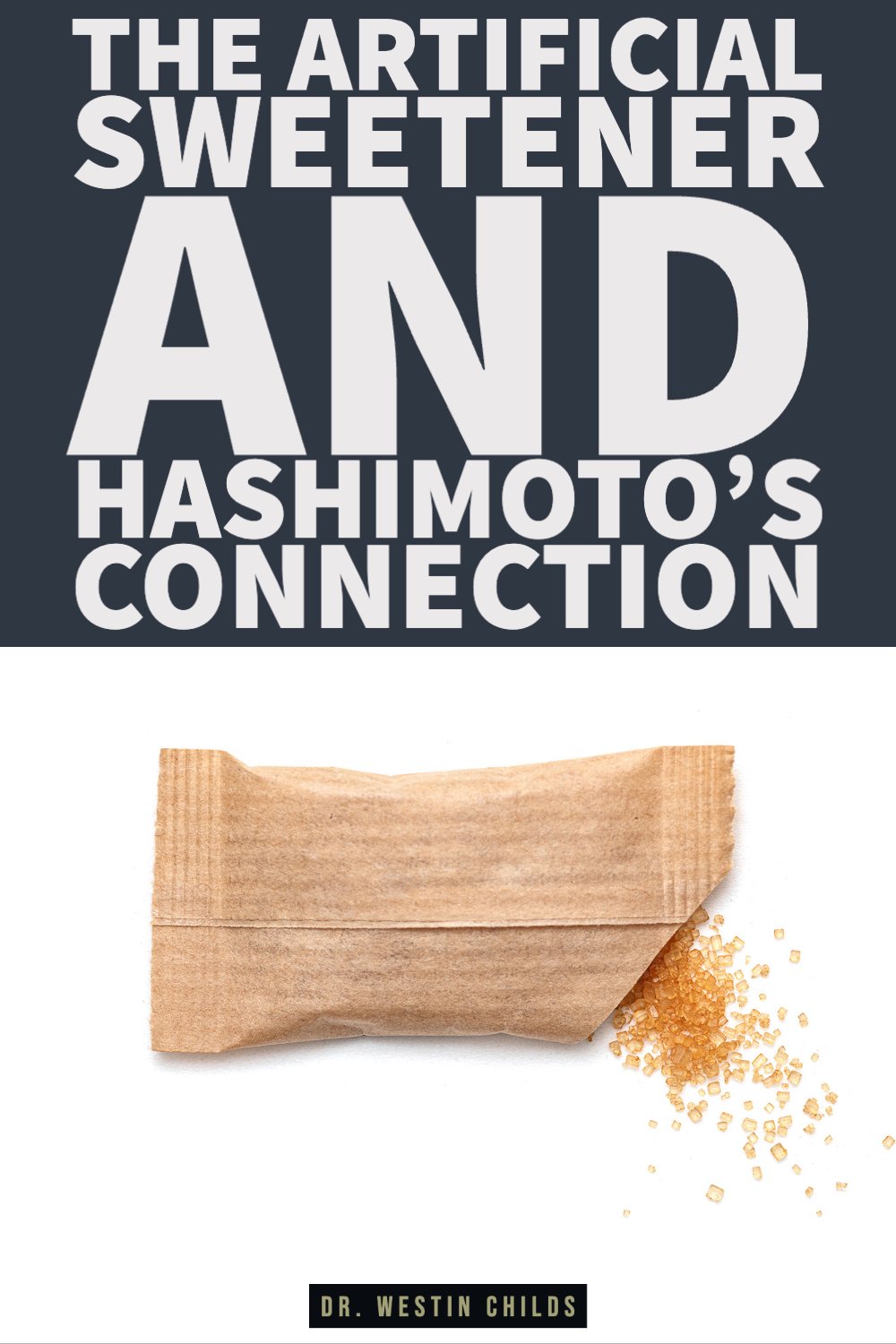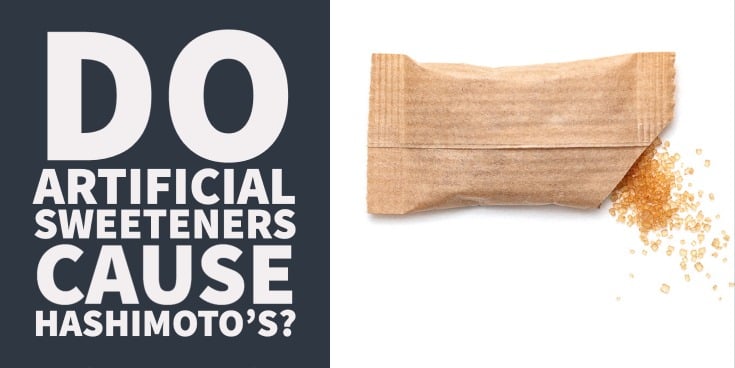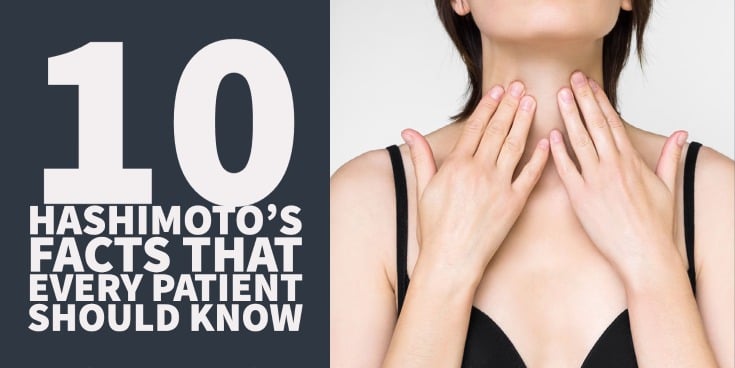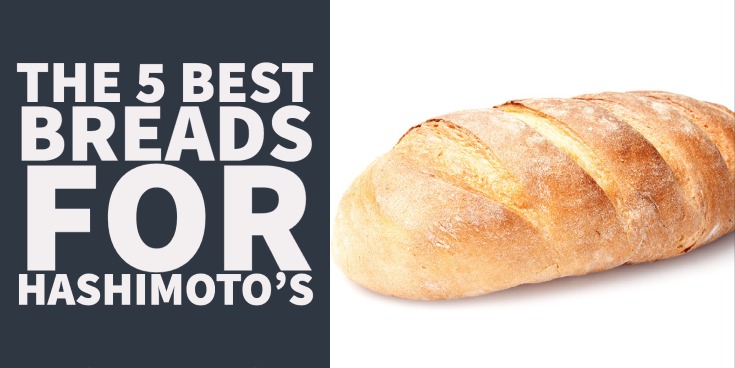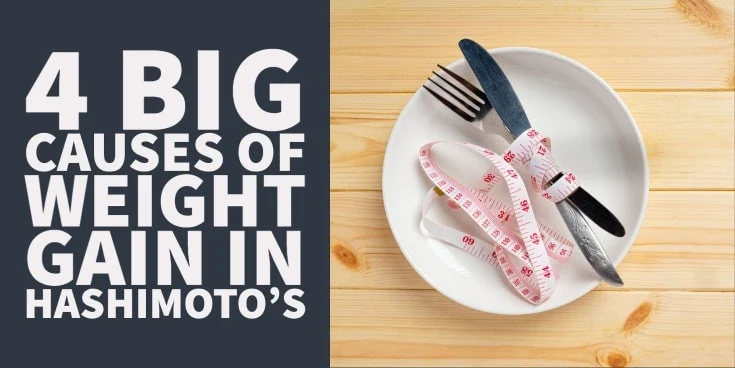The use of artificial sweeteners like Splenda and sucralose has exploded over the last two decades.
So much so that data from NHANES shows that up to 30% of adults report having low-calorie sweeteners daily (1)!
Since the time that these artificial sweeteners have been released and used by the general population, there has been an increase in multiple chronic diseases through the same time period.
Now this doesn’t mean that the two are linked, but it definitely means we should spend some time trying to figure out if there is a real connection between the use of these low-calorie sweeteners and potential health problems.
One health problem that’s worth discussing today is the potential connection between the use of artificial sweeteners and the autoimmune disease Hashimoto’s:
This is particularly concerning because one of the main reasons that people decide to use these low-calorie sweeteners is for their alleged benefit on weight.
After all, who doesn’t love the idea of tasting sweet things without experiencing the extra calories that they provide?
This is the siren song of artificial sweeteners and other low-calorie sweeteners.
Patients with hypothyroidism and Hashimoto’s, are very likely to be more susceptible to this allure given the connection between low thyroid problems and weight gain.
We know that women use these sweeteners more than men and that women get Hashimoto’s at a rate that is 6 to 10x higher than men.
For this reason, this population should be extra careful when considering using them.
DOWNLOAD FREE RESOURCES
Foods to Avoid if you Have Thyroid Problems:
I’ve found that these 10 foods cause the most problems for thyroid patients. Learn which foods you should avoid if you have thyroid disease of any type.
The Complete List of Thyroid Lab tests:
The list includes optimal ranges, normal ranges, and the complete list of tests you need to diagnose and manage thyroid disease correctly!
How Removing Artificial Sweeteners May Put Hashimoto’s Into Remission
So, is there a connection between artificial sweeteners and the development of Hashimoto’s?
Potentially!
One case report highlights this connection perfectly (2):
In this report, a 52-year-old woman who was diagnosed with Hashimoto’s was able to completely normalize her thyroid lab tests, including her TSH and thyroid antibody levels, just by eliminating sucralose from her diet.
By her own report, she consumed roughly 6 grams/dl of artificial sweeteners every day for the last 14 years and during this time, the only symptom she noticed was weight gain.
By the time she presented to the doctor, she had a TSH of 12.2 and a TPO antibody level of 196 which is a classic presentation for Hashimoto’s hypothyroidism.
And this is where things get interesting.
Her doctors put her on levothyroxine which is the standard of care and what pretty much any other conventional doctor would recommend in the same situation.
Taking levothyroxine caused her TSH to lower which, again, is exactly what you’d expect.
But this patient took it upon herself to do more.
She recognized that there was a connection between her 20 pounds of weight gain and the use of artificial sweeteners so she decided to eliminate them from her diet.
As a result of making this one change, her thyroid function return to normal and her TSH actually started to go into the hyperthyroid range.
This happened because she no longer needed the levothyroxine!
But more importantly, her TPO antibody level completely normalized as well.
This means that she experienced remission because both her thyroid and immune system had normalized.
And this is the standard by which I would consider someone with Hashimoto’s in remission as well.
Obviously, the doctors were very surprised by the result which is why they wrote up this case study.
But before they did, they made sure to try and control for any other variables which may have confounded these results.
After controlling for everything that they could, and trying their best to find a reason for her spontaneous remission, they came to the conclusion that the only thing that could have done this was the removal of artificial sweeteners from her diet.
Now does a case report mean that there is a real connection between Hashimoto’s and the use of artificial sweeteners?
No, it definitely doesn’t.
But what it does tell me is that there is a potential connection and when you look at all of the information available, it becomes clear avoiding these sweeteners is probably a good idea for most people who have Hashimoto’s.
Here’s why:
#1. There are very few treatments available for patients with Hashimoto’s.
The reality is that patients who have this autoimmune disease, are severely lacking in the treatment option department.
Really the only treatment available to them is thyroid medication which is usually prescribed as levothyroxine.
And, as you will recall, this is exactly what the doctors gave this patient.
But, as you might have already guessed, levothyroxine is really just a treatment used to mask the symptoms of hypothyroidism because it does nothing to reverse the underlying disease.
In the case that we just discussed, the primary treatment that helped reverse the condition was the change in diet and the removal of artificial sweeteners.
I’ve been preaching for a long time that diet has the potential to help patients who have Hashimoto’s but the biggest problem with diet is that it’s hard to prove that it truly has a positive effect.

After all, we have to come to the likely conclusion that just because artificial sweeteners may be a problem for some people with Hashimoto’s, there may be plenty of people with the exact same condition who can tolerate them just fine.
For this reason, it’s really hard to prove that changing one’s diet will act as a treatment for Hashimoto’s.
But, because there are so few options available, it’s a no-brainer to give it a try especially because…
#2. You won’t cause any harm by avoiding them!
I’m not trying to suggest that the sky is falling and that artificial sweeteners are the bane of human existence.
But why would you bother consuming them if you don’t have to and if their consumption even has a small percentage of causing problems?
It just doesn’t make any sense.
The only reason you could maybe suggest that keeping them in your diet is worth it is if they had some beneficial effect or if they caused some harm if you avoided them.
But neither is true.
You’ll be just fine if you eliminate these sweeteners from your diet and their benefits have never really been proven.
In fact, given available data, it’s far more likely that they cause more harm than good based on what we know.
This leads us to…
#3. The use of artificial sweeteners has been linked to other health problems in humans and animals.
It would be one thing if we had a lot of data suggesting that the use of artificial sweeteners had some benefit on weight or some other health-related measure.
But that’s not what we see.
Instead, we see that major organizations, like the world health organization, recommend against their use by citing that not only do they provide zero benefits, but their long-term use may be associated with an increased risk of type II diabetes, cardiovascular disease, and mortality (3).
But forget about these potential concerns for a second.
We also see some research that suggests that artificial sweeteners may have a suppressive effect on the immune system (4).
These studies have been done in Petri dishes and on animals, so we can’t extrapolate their data to humans quite yet, but it seems plausible that this connection may be why the patient we just discussed saw a resolution in her condition when avoiding sucralose.
If you zoom out and look at the big picture, you see that since the FDA approved aspartame and sucralose in the 1990s, we’ve seen a massive rise in chronic inflammatory diseases which track with the increase in the use of these compounds.
Again, correlation does not equal causation, but we sure are seeing a lot of smoke.
It would be one thing if these artificial sweeteners were your only option, but they aren’t…
#4. There’s no need to consume artificial sweeteners given that there are more natural low-calorie sweet options available.
There are two major classes of sweeteners that you should know about.
Artificial low-calorie sweeteners include:
Aspartame, Acesulfame potassium, Sucralose, Neotame, Saccharin.
And the natural, plant-based low-calorie sweeteners include:
Sugar alcohols (erythritol and xylitol), stevia, monk fruit (luo than guo), thaumatin.
Artificial sweeteners have been synthetically modified to be excessively sweet (hundreds of times sweeter than sucrose) and are not considered naturally occurring.
Natural sweeteners, on the other hand, are considered to be natural because they are typically extracted from fruits, roots, and leaves of plants.
The point I’m trying to make here is that you don’t HAVE to use artificial sweeteners if you want to sweeten up whatever you are eating.
Ideally, you’d cut out excessive sweetness from your diet so that your taste buds can become desensitized to highly processed sugar substitutes, but if you are going to have something then you might as well have the more natural option.
These natural sweeteners don’t seem to carry the same baggage and potential complications as their artificial step-cousins do.
#5. There are other, better ways for patients with Hashimoto’s to lose weight!
I get the appeal:
No matter who you are, there’s some type of sweet food that calls your name in the wee hours of the night.
Whether that’s cupcakes, donuts, chocolate, lemonade, or whatever, there’s something that you crave.
And given the alternative, which is massive willpower and the exclusion of these foods from your diet almost completely, it’s no reason why people opt for sugar substitutes.
Can you imagine a world where you can eat cakes, pastries, pizza, or whatever else you desire while still maintaining your weight?
In essence, that’s really what these sugar substitutes are trying to sell you.
But here’s the rub:
It just doesn’t work.
Replacing sugary sweets with a zero-calorie sugar substitute may sound appealing, but doing so won’t help you lose weight.
In fact, the opposite is true.
Large-scale studies show a positive correlation between artificial sweetener use and weight gain (5).
But you know what does work?
Eating real whole foods, exercising regularly, getting more sleep, reducing your stress, optimizing your thyroid medication, and taking the right supplements.
Not only will these things help you lose weight and keep it off, but they also have the added benefit of helping put your Hashimoto’s into remission.
These treatments will not only help your thyroid but your overall health as well.
If you’re having a hard time losing weight and you think your thyroid is contributing then I would recommend reading this article next.
It walks you through the most common mistakes that thyroid patients make when trying to lose weight.
Final Thoughts
Should you avoid artificial sweeteners if you have Hashimoto’s?
I think my opinion on this is pretty clear but in case you wanted me to come out and say it, the answer is yes.
Based on all of the research I’ve done, I just can’t find a single good reason to use these compounds.
Yes, they may be fine in low doses for lots of people, and yes, they may NOT cause long-term problems, but why take the risk?
If, for whatever reason, you are absolutely adamant about using these sweeteners, then the best course of action would be to limit your consumption and only use them in the short term.
It may be possible to extract some benefit from them if you use them in this way.
However, a much better alternative would just be to substitute their use for something like stevia or erythritol.
Now I want to hear from you:
Are you currently consuming artificial sweeteners? If so, which kind?
Do you think you can eliminate them from your diet or would you find it too difficult? If not, how come?
Were you aware that these sweeteners don’t actually help with weight loss and may actually contribute to weight gain?
Were you aware of their connection to other medical conditions?
Leave your questions or comments below!
Scientific References
#1. ncbi.nlm.nih.gov/pmc/articles/PMC5578610/
#2. ncbi.nlm.nih.gov/pmc/articles/PMC6221534/
#3. who.int/news/item/15-05-2023-who-advises-not-to-use-non-sugar-sweeteners-for-weight-control-in-newly-released-guideline
#4. ncbi.nlm.nih.gov/pmc/articles/PMC8497813/
#5. ncbi.nlm.nih.gov/pmc/articles/PMC2892765/
